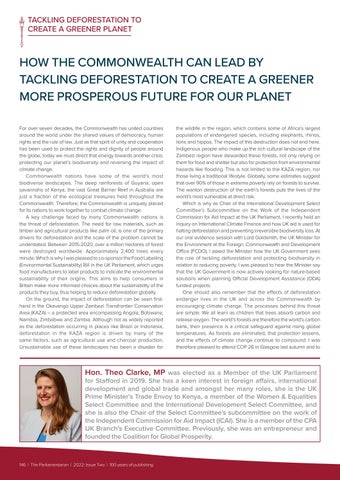TACKLING DEFORESTATION TO CREATE A GREENER PLANET
HOW THE COMMONWEALTH CAN LEAD BY TACKLING DEFORESTATION TO CREATE A GREENER MORE PROSPEROUS FUTURE FOR OUR PLANET For over seven decades, the Commonwealth has united countries around the world under the shared values of democracy, human rights and the rule of law. Just as that spirit of unity and cooperation has been used to protect the rights and dignity of people around the globe, today we must direct that energy towards another crisis: protecting our planet’s biodiversity and reversing the impact of climate change. Commonwealth nations have some of the world’s most biodiverse landscapes. The deep rainforests of Guyana, open savannahs of Kenya, the vast Great Barrier Reef in Australia are just a fraction of the ecological treasures held throughout the Commonwealth. Therefore, the Commonwealth is uniquely placed for its nations to work together to combat climate change. A key challenge faced by many Commonwealth nations is the threat of deforestation. The need for raw materials, such as timber and agricultural products like palm oil, is one of the primary drivers for deforestation and the scale of the problem cannot be understated. Between 2015-2020, over a million hectares of forest were destroyed worldwide. Approximately 2,400 trees every minute. Which is why I was pleased to co-sponsor the Food Labelling (Environmental Sustainability) Bill in the UK Parliament, which urges food manufacturers to label products to indicate the environmental sustainability of their origins. This aims to help consumers in Britain make more informed choices about the sustainability of the products they buy, thus helping to reduce deforestation globally. On the ground, the impact of deforestation can be seen firsthand in the Okavango Upper Zambezi Transfrontier Conservation Area (KAZA) – a protected area encompassing Angola, Botswana, Namibia, Zimbabwe and Zambia. Although not as widely reported as the deforestation occurring in places like Brazil or Indonesia, deforestation in the KAZA region is driven by many of the same factors, such as agricultural use and charcoal production. Unsustainable use of these landscapes has been a disaster for
the wildlife in the region, which contains some of Africa’s largest populations of endangered species, including elephants, rhinos, lions and hippos. The impact of this destruction does not end here. Indigenous people who make up the rich cultural landscape of the Zambezi region have stewarded these forests, not only relying on them for food and shelter but also for protection from environmental hazards like flooding. This is not limited to the KAZA region, nor those living a traditional lifestyle. Globally, some estimates suggest that over 90% of those in extreme poverty rely on forests to survive. The wanton destruction of the earth’s forests puts the lives of the world’s most vulnerable at direct risk. Which is why as Chair of the International Development Select Committee’s Subcommittee on the Work of the Independent Commission for Aid Impact at the UK Parliament, I recently held an inquiry on International Climate Finance and how UK aid is used for halting deforestation and preventing irreversible biodiversity loss. At our oral evidence session with Lord Goldsmith, the UK Minister for the Environment at the Foreign, Commonwealth and Development Office (FCDO), I asked the Minister how the UK Government sees the role of tackling deforestation and protecting biodiversity in relation to reducing poverty. I was pleased to hear the Minister say that the UK Government is now actively looking for nature-based solutions when planning Official Development Assistance (ODA) funded projects. One should also remember that the effects of deforestation endanger lives in the UK and across the Commonwealth by encouraging climate change. The processes behind this threat are simple. We all learn as children that trees absorb carbon and release oxygen. The world’s forests are therefore the world’s carbon bank, their presence is a critical safeguard against rising global temperatures. As forests are eliminated, that protection lessens, and the effects of climate change continue to compound. I was therefore pleased to attend COP 26 in Glasgow last autumn and to
Hon. Theo Clarke, MP was elected as a Member of the UK Parliament for Stafford in 2019. She has a keen interest in foreign affairs, international development and global trade and amongst her many roles, she is the UK Prime Minister’s Trade Envoy to Kenya, a member of the Women & Equalities Select Committee and the International Development Select Committee, and she is also the Chair of the Select Committee’s subcommittee on the work of the Independent Commission for Aid Impact (ICAI). She is a member of the CPA UK Branch’s Executive Committee. Previously, she was an entrepreneur and founded the Coalition for Global Prosperity.
146 | The Parliamentarian | 2022: Issue Two | 100 years of publishing
